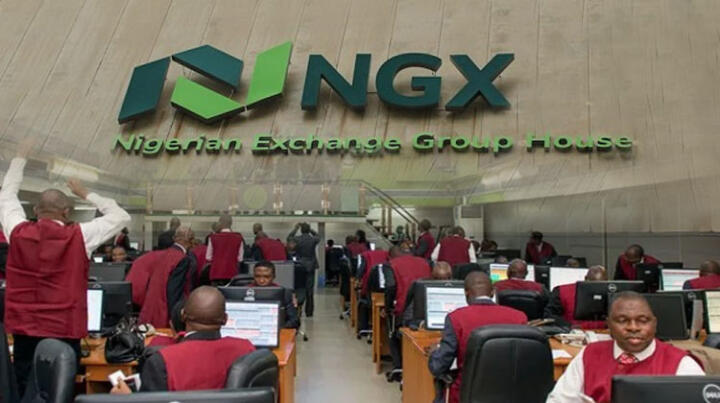The Nigerian equities market on Monday witnessed a significant dip as profit-taking activities among investors dragged the overall performance of the Nigerian Exchange Limited (NGX). The bearish trend resulted in a loss of about N325 billion in market capitalization, signaling a pullback after weeks of sustained rallies that had pushed the stock market to new highs. Analysts attributed the downturn to cautious sentiment among investors who sought to lock in gains amid ongoing economic uncertainties.
Data from the NGX showed that the All-Share Index (ASI) slipped by 0.57 percent, closing at 98,552.76 basis points, compared to the previous trading session’s 99,116.64 points. Similarly, the market capitalization declined from N55.09 trillion to N54.77 trillion, representing a N325 billion loss. The drop marked a pause in the bullish momentum that had driven stocks upward in recent weeks, fueled by improved earnings reports, government reforms, and foreign investment inflows.

Market watchers said the decline was largely influenced by sell-offs in some highly capitalized stocks, particularly in the banking, industrial goods, and consumer goods sectors. Notable losses were recorded in shares of companies like Dangote Cement, Zenith Bank, and Nestlé Nigeria, all of which play a critical role in determining the overall direction of the market. The decline in these stocks outweighed modest gains seen in the oil and gas sector, where Seplat and Oando recorded slight upticks.
Analysts explained that the profit-booking trend was not unusual given the magnitude of gains recorded in the last few weeks. According to them, many institutional and retail investors who had enjoyed the rally were compelled to cash out to maximize returns. They added that the sell-off pressure was compounded by concerns over rising inflation, foreign exchange volatility, and the need for liquidity ahead of upcoming corporate actions in the financial sector.
The volume of transactions for the day also declined, reflecting cautious participation. Investors traded approximately 310 million shares valued at N5.1 billion across 6,200 deals, compared to higher volumes and values recorded in previous sessions. The banking sector remained the most active in terms of volume, accounting for nearly 40 percent of the total trades. However, the sector’s negative performance weighed heavily on the broader market index.
On the gainers’ chart, stocks such as Transcorp, UAC Nigeria, and BUA Foods managed to close higher, providing a slim cushion against deeper market losses. Yet, their gains were not sufficient to offset the broad-based declines in other bellwether stocks. On the losers’ table, Dangote Cement and Zenith Bank led with notable price drops, followed by Guinness Nigeria and Lafarge Africa.
Market experts noted that the bearish turn could persist in the short term unless fresh catalysts emerge to reignite investor confidence. They pointed to upcoming half-year earnings releases as a potential trigger for renewed momentum, especially if companies report stronger-than-expected results. In addition, clarity on government economic policies, particularly in the foreign exchange market, may also influence investor sentiment in the coming weeks.
Some analysts, however, argued that the dip should be seen as a healthy correction rather than the start of a prolonged downtrend. They maintained that the Nigerian stock market remains fundamentally strong, with attractive valuations that continue to lure both local and foreign investors. They added that the resilience of the oil and gas sector, alongside renewed interest in telecommunication stocks, could help stabilize the market.
Investor confidence is also expected to be supported by the government’s reform agenda under President Bola Tinubu, which aims to strengthen economic fundamentals and attract more capital inflows. Policies targeted at boosting foreign exchange liquidity, improving infrastructure, and supporting key industries are being closely monitored by market stakeholders. These factors, experts say, will play a vital role in determining whether the current bearish sentiment is temporary or prolonged.
Internationally, global market trends are also having an impact on Nigerian equities. With oil prices fluctuating due to geopolitical tensions and uncertainty in major economies like China and the United States, emerging markets such as Nigeria are feeling the ripple effects. The strengthening of the U.S. dollar and rising interest rates abroad are also encouraging capital outflows from developing markets, thereby pressuring local equities.
Despite these headwinds, long-term investors remain optimistic. They argue that Nigeria’s young population, expanding consumer base, and ongoing reforms present opportunities that will continue to underpin market growth in the medium to long term. Some portfolio managers are advising clients to take advantage of the current dip to accumulate fundamentally strong stocks that are likely to rebound once market conditions improve.
Looking ahead, the focus will be on upcoming macroeconomic data, corporate earnings reports, and the Central Bank of Nigeria’s monetary policy direction. If inflationary pressures ease and the naira stabilizes, market conditions could improve, paving the way for another rally. For now, however, investors are expected to remain cautious, with a mix of profit-taking and bargain hunting shaping daily trading activities.
In conclusion, while Monday’s N325 billion dip underscores the volatility of the Nigerian equities market, it also highlights the cyclical nature of trading where profit booking is a normal part of market dynamics. Analysts continue to stress that investors with a long-term outlook should not panic over short-term losses but rather view the dip as a buying opportunity in fundamentally strong stocks. As economic reforms deepen and global conditions stabilize, the Nigerian stock market is likely to regain momentum, offering opportunities for growth and wealth creation.
Support InfoStride News' Credible Journalism: Only credible journalism can guarantee a fair, accountable and transparent society, including democracy and government. It involves a lot of efforts and money. We need your support. Click here to Donate
